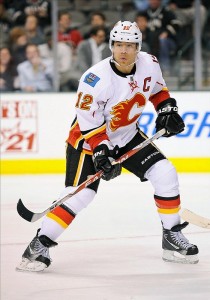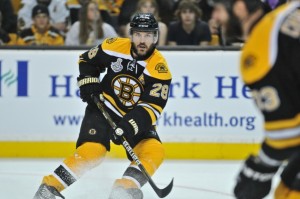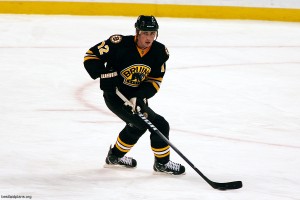By Wayne Whittaker, Boston Bruins Correspondent
With names like Jarome Iginla, Martin St. Louis and Jaromir Jagr being casually tossed into conversation around Boston, it can be easy to get swept up in the hype of the upcoming trade deadline. The Bruins are positioning themselves for another deep playoff run, and will be looking to fine tune their lineup in the coming days.
But really, is there any reason Bruins fans should be expecting general manager Peter Chiarelli to pull the trigger on a blockbuster deal by the noon deadline on April 3?

Historically, Chiarelli has opted for smaller deals that target specific areas of need in Boston’s lineup. The most obvious examples of this are his trade deadline acquisitions of Mark Recchi, Chris Kelly, and Rich Peverley, which eventually culminated in a Stanley Cup victory in 2011.
And while it’s quite possible we could see the Bruins swap a combination of high draft picks and highly touted prospects for an aging superstar, a quick look at Chiarelli’s trade deadline history with Boston could indicate otherwise.
—
2006-2007
Chiarelli’s rookie year at the helm of an original six franchise that was strictly in rebuilding mode.
While technically not a deadline deal, the GMs growing pains are pretty evident in hindsight when reflecting on the Kris Versteeg for Brandon Bochenski trade. Also in early February, the Bruins added cornerstone Andrew Ference and Chuck Kobasew in exchange for Wayne Primeau and Brad Stuart.
As for the deadline day itself, Chiarelli added two solid blue liners who would go onto have successful careers in Boston. Aaron Ward (from the New York Rangers, for Paul Mara) and Dennis Wideman (from St. Louis for Brad Boyes).
Season result: 5th in Northeast Division. Coach Dave Lewis fired.
2007-2008
While many pundits predicted Boston would finish in close to the bottom of the barrel in the Eastern Conference, the Bruins put together a surprising season under first year coach Claude Julien. While certainly not Cup contenders, the Bruins were setting their sights on a playoff spot.
Peter Chiarelli was well aware of what he was dealing with. With many promising prospects, like David Krejci, just on the cusp of reaching the NHL level, Boston was unwilling to sell its future for short-term success.
In a defining moment for the 2007-2008 season, the Bruins were bystanders at the trade deadline.
Season result: 3rd in Northeast Division. Lost in Conference Quarter-Finals to Montreal in seven games.
2008-2009

The ’08-’09 Bruins had one of the clubs best seasons in nearly three decades. Finishing just one point shy of the President’s Trophy, Boston led the Eastern Conference for the majority of the regular season.
But again, instead of making a huge splash come deadline day, Boston made a strategic move to address a specific need in the depth chart. Namely, veteran experience and a solid net-front presence.
In what is arguably one of Chiarelli’s all-time best trades, the Bruins acquired Mark Recchi and a 2nd round draft pick from the Tampa Bay Lightning in exchange for Martins Karsums and Matt Lashoff. The Recchi experimented was an instant success, and the future hall-of-famer would spend the rest of his career in Boston.
Also added to the roster was defenseman Steve Montador, who would turn out to be a rental. Montador had a rocky post-season with Boston, and was not re-signed in the offseason.
Season result: 1st in Northeast Division. Lost in Conference Semi-Finals to Carolina in seven games.
2009-2010
Coming off such a dramatic turnaround just a year prior, the 2010 Bruins were a frustrated group fighting injuries, underachievement and bad luck.
But the expectation for the Bruins was to reach the Conference Finals, and with that in mind Chiarelli continued the trend of addressing specific needs.
The previous off-season, Boston was looking for a solid #2 defenseman who could help them with their offensive breakouts. The short list of defenseman the Bruins were targeting included Derek Morris and Dennis Seidenberg. At the time, Boston opted for Morris.
Morris was having an average season with the Bruins, and on deadline day 2010 Chiarelli decided to make up for his lapse in judgement. Morris was sent to Phoenix for a 3rd round pick, and the Bruins then went on to acquire Seidenberg from Florida (along with Matt Bartkowski) in exchange for Byron Bitz, Craig Weller, and a 2nd round pick.
Seidenberg’s first season with Boston would be cut short, as he was injured with a wrist laceration prior to the post-season. However he would prove to be instrumental in the 2011 Bruins Cup run, and continues to be one of the best bargains on Boston’s roster.
Season result: 3rd in Northeast Division. Lost in Conference Semifinals to Philadelphia in seven games.
2010-2011
The final pieces of the puzzle were being put into place in 2011, and Boston was gearing up for a deep playoff run.

With the Bruins power play struggling (sound familiar?), rumors began heating up that Boston would be looking to add Tomas Kaberle. These rumors were nothing new, they had been appearing annually around the Hub. But this time around there was something different, the Bruins felt they were only a piece or two away from a Stanley Cup.
Boston would eventually acquire Kaberle from Toronto in what can be considered a rare blockbuster trade in the Peter Chiarelli era. Toronto received a 1st and 2nd round pick, as well as highly touted prospect Joe Colborne.
In what were initially seen as minor deals, Boston was able to solidify their lineup with the depth acquisitions of Rich Peverley (to Winnipeg in exchange for Blake Wheeler, and Mark Stuart) and Chris Kelly (2nd round pick to Ottawa). There was a learning curve, but come playoff time both players had an enormous impact on the Bruins.
The Kaberle deal made headlines, but the Kelly/Peverley pickups made the difference. Along with a little help from deadline acquisitions from the past (Seidenberg, Recchi), the Bruins won their first Stanley Cup in 39 years.
Season result: 1st in Northeast. Stanley Cup Champions.
2011-2012
With the core of the Stanley Cup winning team still in tact, there was no need for Boston to make high-risk moves. However, the 2011-2012 trade deadline could be considered Chiarelli’s least effective.
Greg Zanon, Brian Rolston, and Mike Mottau were all acquired via trades and none of those players would dress for Boston the following year. Zanon was initially seen as a solid #6-7 defenseman, but he never quite fit in as expected. Mottau, another depth defenseman signing, was a local boy who only played a handful of games in black and gold. Brian Rolston was reunited with his old team, but the magic was clearly gone.
Season result: 1st in Northeast. Lost in Conference Quarterfinals to Washington in seven games.
2012-2013: What to Expect
Will the Bruins finally fulfill their fantasy of having Jarome Ignila on the team? Will somehow-41-year-old Jaromir Jagr wear a different shade of black and gold? Possibly.
While Boston is once again considered a Cup contender, they will be looking to avoid early playoff disappointment for a second year in a row.
It’s becoming quite obvious that Boston’s biggest needs are scoring depth (a top 6 forward is preferred), and a truly solid #3-4 defenseman. Some relief is on the way, as prospect Carl Soderberg is expected to make the trip overseas and join the Bruins as soon as his team’s Swedish Elitserien playoff run is complete. But while rumors of Mark Streit being dealt from Long Island may not come to fruition, Stephane Robidas, Kimmo Timmonen or Dan Boyle could be targeted by the Bruins.
The Bruins are clearly still in the hunt for Jarome Iginla, but if the cost is as high as it is rumored to be, Chiarelli may once again be looking to make slightly smaller trades to bolster up his Bruins. The Pittsburgh Penguins have been very busy leading up to the trade deadline, and seeing as how both they and the Bruins consider each other to be the main threats in the East, one would anticipate a reaction from the Boston brass.